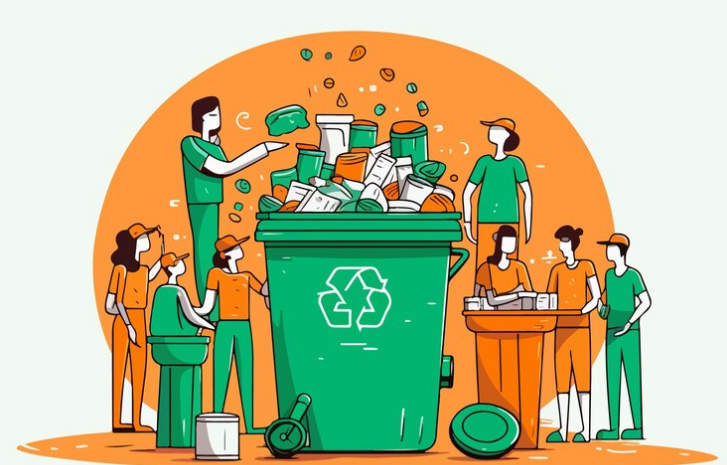In today’s rapidly evolving world, where environmental concerns are at the forefront of global discourse, the imperative for businesses to embrace sustainability practices has never been more pronounced. Facility maintenance is one of the areas that is expected to have a significant influence in this respect. As stewards of buildings and infrastructure, facility maintenance firms have a unique potential to effect substantial change by implementing eco-friendly practices.
From minimizing energy consumption to implementing waste reduction strategies, there are numerous avenues through which these companies can contribute to a healthier planet. By harnessing innovative technologies, rethinking traditional methodologies, and fostering a culture of environmental mindfulness, these companies can chart a course towards a greener future. At its core, green facility maintenance embodies a holistic approach that transcends mere compliance with regulations. It embodies a commitment to optimizing resource utilization, minimizing waste generation, and maximizing energy efficiency throughout the lifecycle of facilities. From commercial buildings to industrial complexes, the principles of environmental sustainability offer a blueprint for responsible stewardship.
In this article, we’ll delve into 7 actionable steps that facility maintenance companies can take to bolster their environmental stewardship efforts;

1. Switch to Eco-Friendly Cleaning Products
In recent years, the world has witnessed a growing concern for the environment and human health, leading to a shift towards more sustainable practices in various aspects of life. One significant area where this shift is taking place is in the realm of cleaning products. Traditional cleaning products, laden with harmful chemicals, have long been the go-to choice for maintaining cleanliness and hygiene in homes, offices, and public spaces. However, their widespread use has come at a cost – both to the environment and to human health.
Furthermore, the environmental impact of traditional cleaning products cannot be overstated. When these products are washed down drains or disposed of improperly, they often end up in waterways, where they can contaminate ecosystems and harm aquatic life. Additionally, the manufacturing processes involved in producing these chemical-laden cleaners often result in the release of harmful pollutants into the air and water, contributing to air and water pollution and further exacerbating environmental degradation.
By choosing biodegradable cleaners and non-toxic disinfectants, facility maintenance companies can minimize their ecological impact while still effectively cleaning and sanitizing spaces. This not only benefits human health and the environment but also helps to create a safer and more sustainable world for future generations.

2. Implement Energy-Efficient Practices
Facility maintenance companies play a pivotal role in shaping the environmental footprint of buildings and infrastructure. From office complexes to manufacturing facilities, these companies oversee the operation and upkeep of spaces that collectively account for a substantial portion of global energy consumption. Consequently, the choices made by facility maintenance providers regarding energy usage reverberate far beyond individual buildings, impacting ecosystems, communities, and the planet as a whole.
One of the fundamental pillars of energy efficiency in facility maintenance lies in the optimization of heating, ventilation, and air conditioning (HVAC) systems. These systems, ubiquitous in commercial and residential buildings alike, often account for a substantial portion of energy consumption. By implementing routine maintenance protocols and leveraging advanced technologies such as programmable thermostats, facility maintenance companies can significantly enhance the energy efficiency of HVAC systems. As the imperative for sustainability grows ever more pressing, facility maintenance companies stand poised to lead the charge towards a greener, more sustainable future.

3. Reduce Water Usage in Facility Maintenance
In the pursuit of environmental sustainability and cost-efficiency, the imperative to reduce water usage within facility maintenance operations has never been more critical. Water, a finite and precious resource, faces increasing strain due to population growth, industrialization, and climate change-induced water scarcity. Thus, facility maintenance companies must proactively adopt strategies to conserve water, not only to mitigate environmental impact but also to achieve significant cost savings in the long run.
The integration of water recycling systems presents a promising avenue for sustainable water management within facility maintenance operations. Water recycling technologies, such as greywater reuse systems, enable the treatment and repurposing of wastewater for non-potable applications, such as irrigation, flushing, and cooling. By harnessing recycled water resources, facility maintenance companies can alleviate pressure on freshwater sources while simultaneously reducing reliance on municipal supply systems. This not only conserves water but also enhances resilience against water scarcity and supply disruptions, ensuring continuity in facility operations.

4. Promote Recycling and Waste Reduction
In the realm of facility maintenance, the drive towards sustainability and environmental responsibility has become increasingly imperative. As custodians of the built environment, facility maintenance companies hold a significant role in shaping the ecological footprint of the spaces they manage. With global concerns over climate change and resource depletion escalating, there’s an urgent call to reevaluate traditional waste management practices and embrace strategies that prioritize recycling and waste reduction.
The importance of proper waste management cannot be overstated. Inefficient disposal methods not only contribute to the proliferation of landfills but also exacerbate pollution and resource depletion. Facility maintenance companies, being integral stakeholders in building operations, have a unique opportunity to spearhead initiatives that mitigate these adverse effects and foster a culture of sustainability.
Education plays a pivotal role in fostering a culture of waste reduction within facility maintenance teams. Training sessions and informational materials can enlighten staff about the environmental impact of their actions and empower them to make more sustainable choices. By instilling a sense of ownership and accountability, these educational efforts cultivate a collective ethos of stewardship towards the environment.

5. Prioritize Sustainable Materials and Practices
In the contemporary landscape of facility maintenance and construction, the imperative for sustainability has transcended mere buzzword status to become an ethical and practical necessity. As our awareness of environmental challenges deepens and the urgency to mitigate them amplifies, facility maintenance companies find themselves at the forefront of a transformative shift towards sustainable practices. Embracing this shift involves a fundamental reevaluation of traditional approaches to renovation and construction, with a resolute commitment to prioritizing sustainable materials and practices.
In essence, the imperative to prioritize sustainable materials and practices in facility maintenance represents a transformative opportunity to reconcile the imperatives of economic growth with the exigencies of environmental preservation. By embracing sustainable construction, facility maintenance companies can not only mitigate their ecological footprint but also foster innovation, enhance resilience, and forge a path towards a more equitable and sustainable future. As custodians of the built environment, they wield immense influence in shaping the trajectory of human civilization, and it is incumbent upon them to wield that influence responsibly, with a steadfast commitment to leaving a legacy of sustainability for future generations.

6. Optimize Transportation
Transportation plays a vital role in facility maintenance operations, enabling the timely delivery of services and ensuring the smooth functioning of various facilities. However, the environmental impact of transportation, particularly in terms of emissions and fuel consumption, poses significant challenges to sustainability efforts. Facility maintenance companies are increasingly recognizing the importance of optimizing transportation practices to minimize their carbon footprint and contribute to mitigating climate change. Optimizing transportation in facility maintenance involves implementing strategies to reduce travel time, distance, and fuel consumption while ensuring the efficient delivery of services.

7. Employee Engagement
Foster a culture of environmental responsibility among your employees by providing training and educational resources on sustainable practices. Encourage employee feedback and participation in green initiatives, and recognize and reward individuals or teams that demonstrate a commitment to environmental stewardship. By engaging employees in your sustainability efforts, you can create a sense of ownership and collective responsibility for reducing your environmental impact.
Moreover, encouraging employee feedback and participation in green initiatives is key to fostering a sense of ownership and engagement. Employees often have valuable insights and ideas for improving sustainability practices within the organization, and creating channels for them to share their feedback and suggestions demonstrates that their input is valued. Whether through suggestion boxes, focus groups, or regular feedback sessions, providing opportunities for employees to voice their opinions fosters a culture of open communication and collaboration, where everyone feels empowered to contribute to the organization’s environmental goals.

Join Summit Property Group in our commitment to a greener tomorrow! As stewards of the environment, we prioritize sustainability in all our endeavors. By choosing Summit, you’re not just taking care and maintaining your dream property; you’re investing in a future where conservation meets comfort. Our eco-conscious approach extends from construction to daily operations, ensuring minimal carbon footprint and maximum environmental impact.
At Summit, we prioritize sustainability in every aspect of our operations, including facility upkeep. By adopting eco-conscious practices, we not only reduce our environmental footprint but also contribute to a healthier, greener future. Join us in our mission to be stewards of the environment by choosing Summit Property Group for your facility maintenance needs. Together, let’s pave the way for a more sustainable future!
At Summit Property Group, we pride ourselves on delivering unparalleled maintenance services that stand out as the very best in the industry.
CLICK HERE to book our services now!

